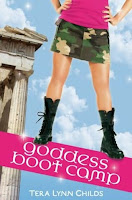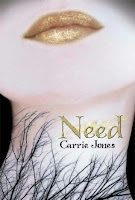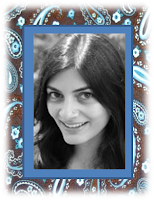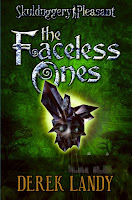 Skulduggery Pleasant
Skulduggery Pleasant is kind of a hottie.
Yeah. We
said it. Skulduggery is a hottie. And it's not just that he throws fireballs, either. There's something way too attractive about a guy who knows how to wear a hat, who is dangerous and witty and funny, and has -- face it -- really,
really good bones.
What Harry Potter was to many American kids, Skulduggery Pleasant is to many British kids, and his popularity in the U.S. is definitely on the rise. We're also Skulduggery fanatics at
Wonderland, and are fascinated by the sly sense of humor, fast-paced action and cleverly-named characters in all of the books. Imagine our glee
(and, okay, Tanita's outright breathless squee-ing) to have gotten to talk to the man behind the magic. We were so tickled -- or, chuffed, as a Brit might say -- that author Derek Landy agreed to speak with us. He's one of those brilliantly creative people who does all kinds of things -- and he started with zombies. As a screenwriter he wrote
Dead Bodies in 2003 ("Every situation is a
grave situation."), and
Boy Eats Girl in 2005, and then moved right on from zombies to... skeletons.
He's an exceptionally intelligent writer, so we were quite flattered when he told us, "These are, without a doubt, the best questions I've ever been asked. Well, almost. The best question I was ever asked was in my second ever school event in 2007, when a kid put up his hand and asked 'Have you ever been in a fight with another writer?' Pretty hard to beat THAT one, I think you'll agree."
Right. Guess that IS a hard one to beat. (And now we kind of wish we'd asked it ourselves...) But we asked him just about everything else--and he rose to the challenge with wit and charm and candor.
(*swoon*)
FW:Welcome to Finding Wonderland!
Mr. Landy, most of our readers are also closet writers, so we always have to ask: what is your writing day like? You get up, feed your cat menagerie (we heard about the cat thing), and then --...? How much of your daily life has changed since becoming such a successful author? How did your family respond to having a writer in their midst? Derek Landy:
Derek Landy: My life has changed utterly since Skulduggery. He has allowed me to buy my own house, stop working on the family farm, and basically live the life I've always dreamed of living. My family is thrilled about everything that's happened, and you can especially see it in my parents' faces. For years, I was the kid they had to worry about, the kid who refused to focus in school, who got kicked out of college, who spent his days dreaming... And now, suddenly, I'm the one whose dreams have come true. For months after I got the news that Harper Collins wanted to publish the book, I'd walk into the kitchen and my parents would instantly break out into the biggest smiles I'd ever seen.
That was back in 2006, of course, when it all began. These days, I've settled into a new routine which I find quite agreeable. I like to get up a little before noon, wander around the house for a bit, check emails, saunter off, eat a couple of apples (apple-eating is my new thing), and drive over to my parents' place (they're only 5 minutes away) and take the dog for a walk.
Three days a week I'll do a little light shopping, mostly buying DVDs and games and comics and books, and I'll return home and answer more emails. Maybe I'll play a video game for an hour or two.
I'd usually start writing anywhere from 3 to 4 in the afternoon, then stop at 6 and drive to my parents' place again (my mother told me she didn't mind me moving out, just as long as I dropped by at least twice a day to have a chat...!) So I have my dinner there, and have a laugh with my folks and my brother, and I take the dog for another walk, and I'll get back to my house at about 7:30.
From this point on, this is when I really write, and I'll write until 3 in the morning. I prefer to write at night because people stop sending emails, and they stop calling, and I'm generally left alone.
Bear in mind, however, that this routine can change drastically. When I'm between books, I force myself to not write anything, so I can build up enthusiasm. But when I'm in the MIDDLE of a book, when I've become obsessed by it, from the moment I wake up to the moment I sleep, I'm writing. With several breaks to walk the dog, naturally.
FW: In so many ways, that's just an ideal schedule. Who else schedules time for both the importance of video games and apples? And writing while everyone else is asleep definitely cuts down on the email interruptions!
What was the biggest challenge in going from writing horror films for an adult audience to writing fantasy for a MG audience? Did you feel you had to sort of tone down the gorefest? How long did it take you to develop the world setting for the stories? DL:
DL: Bizarrely, I haven't really changed my approach now that I'm writing for a younger audience. The only concessions I've made is that nobody curses. I have a healthy respect for the Skulduggery readers, and I'm pretty sure they can handle whatever is thrown at them. There are some pretty gory scenes in these books, but I don't really dwell on that aspect. If someone's head explodes, for example, the only thing I'm going to say is "His head explodes"- I'm not going to describe the blood or the brain matter! It's up to each individual reader to conjure up an image to suit the words- those who want to see gore will grin happily and see gore, those who don't, won't.
When I started writing, I decided early on that these books should be set in a realistic world. This way, all the magic and freaky stuff will seem even weirder, if it's set in a world we recognise as normal. From that, logic told me that all these sorcerers live in an underground society with their own rules, laws, and authorities. The world evolved as I wrote, quite frankly, and it's still evolving today.
FW: Valkyrie Cain (Seriously - Might have to give that name to a child or cat or something),
Tanith Low and China Sorrows, all in their own way are an amazingly diverse crop of strong female characters. What were your influences, in the fantasy genre? And do you feel that there's still a noticeable gender gap in terms of strong female heroines in fantasy? Also--we have to ask--are the names Tanith and China deliberate nods to other fantasy/sci-fi authors?DL: To be honest, populating these books with strong female characters never occurred to me--this was never the objective. The fact is, this is merely how I see most women, and these are the only kinds of women that interest me. My mother is fiercely intelligent, my sisters are formidable, my female friends are admirable--I have been surrounded by strong women my entire life, and this is the only thing I know.
Valkyrie is actually based on a friend of mine, so I know I'd get a slap if I ever wrote a scene where she curls up on a forest floor and cries herself to sleep after a boyfriend breaks up with her...!
From Ripley, in the Alien movies, to Catwoman, to Agent Scully and Buffy, strong female characters are a huge part of the fantasy genre. Gone are the days when the girl would scream and cry and wait for the handsome hero to decide what to do.
Well, they're ALMOST gone...
Oh, and as for China and Tanith, China was the first character to pop into my head after Skulduggery, so her name wasn't based on anyone- but I've always thought that the writer Tanith Lee had the best name EVER, and so when I needed a cool name for a cool girl, Tanith Low was born...!
(Strong women are the only thing he knows, people. That. Is. Awesome.)FW: We're sure everyone asks -- knowing that the first Skulduggery Pleasant was quickly optioned for film -- any news on a Skulduggery movie? As a screenwriter, are you anxious about that -- have concerns that they might totally screw up your story, or are you pretty much blasé on the topic of your books going to film? DL:
DL: The Skulduggery movie is progressing... slowly. There are no guarantees it will ever get made, but we have an excellent screenwriter who has taken over the script, so hopefully we'll end up with something that everyone likes.
Obviously, Skulduggery Pleasant is close to my heart--these books have changed my life, and I owe these characters so much. I want the film to be great. We've seen good books get turned into dreadful films again and again, and that is always a real and genuine risk. But the fact is, nobody sets out to make a bad film, so the object of the game must be that we spot the flaws, we communicate, and we listen to logic. Respect the material and respect the audience, and just pray that we get it right.
FW: There's so much humor in your Skulduggery Pleasant books. Do the jokes come naturally or do you spend time agonizing over them? Is it challenging to balance the humor with the more serious, dramatic elements? Do you think that the sense of humor in the book translates well to other English-speaking countries like the U.S., or do you think we're separated by a common language, and edit accordingly?DL: I think the humour translates into different cultures without much of a problem, and the books are doing well in other languages too, so it would appear that we all laugh at the same things...!
The jokes come naturally to me. Too naturally, in fact. I have tried writing without jokes, I have tried serious stories, but by page three the jokes start to creep in and suddenly I'm writing another comedy. It's really annoying! I honestly don't think I'll ever be able to write something without humour, but I'm still going to try!
As far as balancing the humour with the more serious aspects of the story, it IS a tightrope. Too many jokes, and the tension and the sense of danger are lost. Too little, and the whole thing becomes far too grim. The fact is, I make jokes at really inappropriate times--I made jokes when I was being mugged, for example, and I actually made a few of the muggers laugh. So I tend to throw jokes into moments when most people wouldn't open their mouths--but thankfully I have an editor who looks out for these things!
I am getting better at it, though. I hope.
FW: It's just not everyone who can make jokes while being mugged...
The fight scenes in the SP series are vivid, detailed, and realistic, and we know from your blog that you’re a black-belt martial arts dude. Did you have to learn any other techniques, like staging, for instance, in preparation for the writing process? (Please don't say you learned necromancy!) Alternatively, have you ever unexpectedly used any real-world knowledge from previous jobs or activities in your writing? (Much like all the teachers said we'd use Algebra someday, we'd like to know if picking cauliflower and cabbage on your parents' farm prepared you to write about animated skeletons and zombies.)DL: The reason I include martial arts in such a prominent way is that I was getting so tired of reading fight scenes by writers who have obviously never been in a fight. Fights are awful, and messy, and desperate, and things move so fast and one mistake could end it. For the best fight scenes in books, I recommend Joe R. Lansdale, who also happens to have the best tough guy banter you're ever likely to read. And for the most terrifying fight scene in the last few years, "The Girl Who Played With Fire" would get my vote, when the boxer goes up against the blond giant. Just brilliant.

I'm trying to think of skills that I've learned that I've included in my writing, and I really can't think of any. That Algebra thing is a CON!
(Hah! *WE* thought that Algebra thing was a con, too!)FW: Part of the beauty of Stephanie being able to put off her Stephanie-ness and put on her Valkyrie life by turns is that she is able to, in some ways, put off actually coming to conclusions about her identity, and delay participating in the day-to-day minutiae that make a life...how do you see young readers relating to the idea of being able to take on a different persona? Was there a deliberate thematic choice to include so many characters in disguise? Do you intend this to convey anything about good masquerading as evil (were the Guild ever the "good guys?") or the idea of a centralized "good" in terms of authority figures or government?DL: I think we'd all like a secret identity, we'd all like a name or a mask to hide behind while we do the kinds of things we wouldn't normally do. Valkyrie's situation is pretty much a prime example of how this would work out. On the one hand, she has her reflection to go to school in her place, and to tidy her room and do her homework and generally live the normal life she would otherwise be living, while she's out there saving the world. The downside, as she is going to discover more and more, is that there are elements of normal life that she's going to miss out on. She's growing up under Skulduggery's wing, but this means she doesn't get to bond with her parents the way she really should at her age.
The idea of the reflection, however, seems to have struck a chord with many readers. I get truckloads of letters and emails telling me how much they would love to send their own reflection to school while they did other, more exciting things. There's a part of me that wonders if, maybe, I should be more responsible, and tell these kids that they really should appreciate school and all they can learn there, but the fact is I tend to grin when I read these letters... This PROBABLY makes me a bad influence on an entire generation of kids, but hey, if you're going to be an influence, why not be a bad one?
Besides, Valkyrie is the real role model here. Skulduggery has his ups and downs, but Valkyrie has an incorruptible code of honour that she will not break. I think it's very important that she does not automatically respect authority, but rather that she questions it and tests it until breaking point. Respect, in Valkyrie's eyes, is earned, not given, no matter the job, the uniform, the title or the badge.
I suppose the question of authority keeps popping up in these books. Everyone has an agenda, and nobody can be trusted, not even the people who say they're protecting you. Even our good guys look like bad guys--we have a skeleton and a man covered in scars, we have a beautiful ice queen and the most powerful man on Earth, who just happens to be also one of the scariest. And they are our HEROES.
One of the nicest things about writing these books is that most of the characters are hundreds of years old, so that gives me hundreds of years worth of motivations and secrets to explore as the story progresses. If I were to rewrite these books from the villains' perspective, their goals would be just as honourable as the heroes, just with a different set of standards.
There is no good, there is no evil--there are just people who want what they want.
FW: Huh. That gives us a bit to think about.
So, following up to the last question, these books explore the role of outsiders in whatever society--both the role of those who keep the world safe, who are revered and feared, and those on whom society turns. Skulduggery is, himself, kind of a... um, ghoulie. He is something scary and posthuman whose constant battle is to keep humans safe. Do you see a parallel between the idea of monsters and the idea of outsiders in general? DL:
DL: The fact is, monsters and outsiders are the best kinds of characters to write! Practically every cop movie is about a cop who plays by his own rules, because that's the only way to bring down the bad guy. And so the cop becomes the outsider, doing what he has to do. Skulduggery and Valkyrie and their friends are the outsiders of the magical community, who in turn are the outsiders of our normal society. So, really, Skulduggery is the outsider's outsider--and he's also the monster...!
He's a lot of things, is our Skulduggery...
We have our rules and our laws, and these are good and necessary things, because they keep us safe. But whenever we have a law, we will have a lawbreaker. Whenever we have a rule, we will have something that lives beyond it. The truth is, it takes an outsider to catch a monster. They think alike, they act alike, and the only difference between them is a matter of degrees.
FW: It's hard to say who we're more in love with -- Skulduggery or Valkyrie. They kick butt! They take names! They make quips! They're always out there, fighting Ultimate Evil! Steph/Val does all the cool stuff we dream about, but since she's growing up into those tricky teen years... should we expect her to become suddenly tolerant of vampires watching her sleep and/or... want to date one? Just asking. You don't have to answer this. Or say if you're in favor of either werewolves, or vampires that sparkle, or anything like that. We just... wondered.DL: This is a popular question I'm asked- "When will Valkyrie get a boyfriend?"
I've had suggestions, both practical and downright unsettling, from readers all over the world! Everyone, it seems, has an opinion on this, and they're not shy about letting me know!
Valkyrie WILL get a boyfriend--she is a teenage girl after all, one who tends to get all kinds of attention from all kinds of people! And in future books, she might even embark on relationships that are not exactly healthy. A lot of girls do go through the "bad boy" phase, and I'm sure Valkyrie will be no different.
However--this isn't some wilting wallflower we're talking about here. This is Valkyrie Cain, the coolest character I've ever written, based on the coolest girl I've ever known. You can rest assured she would not be happy to learn that sparkling vampires have been watching her from outside her window every night...!
(*muffled snickers*)FW: *cough* Right. Good to know, good to know.
You are quoted as saying, "Without Harry Potter, I wouldn't have seen children's books as a viable career move, and so I would have tried to shove Skulduggery into some other framework where he wouldn't have fit." Now that you've had time to explore more of the children's lit world than the Potter books, what are some of your favorites? What does it take to feed the kind of creative mind that comes up with people named Ghastly Bespoke? DL:
DL: I tend only to read books by writers who are better than me. I don't see the point of reading anything by someone on the same level, and it's infuriating to read anything by someone who's not as good! So, really, the books I love are by writers who make me look drab and boring by comparison.
"The Graveyard Book" and "Coraline" by Neil Gaiman are two books I wish I was good enough to write. I wish I had an imagination as immense as Clive Barker's, so that I could produce something like "Abarat", or that I was as intelligent as Philip Pullman so that I could dream up "His Dark Materials". Books like these inspire me every time I glance at them on my shelves. I want, one day, to be as good as these people, and that's what I'm working towards.
FW: You want to be as good "someday"? We're happy to tell you, we believe that "someday" started in 2006. You are CLEARLY already there.
So, what's one question interviewers never ask, and you wish they would?DL: I wish interviewers would ask me how did I get to be so brilliant. But they never do.
FW: It is just tragic that they don't ask that. We suspect most interviewers don't ask because they already know the answer. It has something to do with clean-living and apples. Right?
Clearly, at the end of The Faceless Ones, you've left events open for a sequel. We've heard that there are plans for NINE Skulduggery novels. You just had to go one better than the Potter series, didn't you? Why not an even ten? What can we expect from the next book, if you can tell us anything? Are you working on any other projects for young people or adults?DL: The fourth Skulduggery book is called Dark Days, and it's out in most countries next year--I'm not sure when it's out in America, though! I'm hesitant to talk about it, but I will say that it's all about revenge...!
I've always seen the Skulduggery series as three sets of trilogies. The first trilogy, which is now over, is about the Faceless Ones. The second trilogy, which begins with Dark Days, is about the Necromancers. And the third trilogy will be about what the entire series has been about all along--something I can't tell you about just yet...!
I'm writing the fifth book right now (at least, um, I SHOULD be...) so hopefully next year I'll be able to take a break and write something completely new. Our plan is for one Skulduggery book a year, and we’re sticking to that, but I'm hoping to get something else done in between. Whether it will end up being for a younger or an older audience, I haven’t decided.
You can be pretty much guaranteed, however, that it's going to have jokes in it. Because I can't get away from those damned jokes...
FW:We can't wait for the next book! And we're so grateful to you for fitting us in to your busy schedule -- right between the apples and the video games, no doubt. Thank you for making us think, as well as making us laugh. We wish you joy in your writing, and the best of everything.
DO check out the lovely U.S. versions of the Skulduggery covers. Check your local bookstores, please!
Was that NOT as entertaining to read as a Skulduggery Pleasant book? Are you still wondering, "How DID Derek Landy get to be so brilliant?!" If you're not done swooning
(Okay, that swooning thing could just be Tanita, but we won't ask) (Nope, it's not just Tanita--swoon city around here) (Thank-you, AF, it is kinda pathetic to swoon alone) and want to read more about Derek Landy's
multiple cats, or how screenwriting
helped him write strong dialogue, or how much fun he had
helping make the Skulduggery audiobooks, click and read on.
 And, don't forget to check out the rest of today's awesome WBBT author/illustrator interviews:Jim Ottaviani
And, don't forget to check out the rest of today's awesome WBBT author/illustrator interviews:Jim Ottaviani at
Chasing RayCourtney Sheinmel @
BildungsromanMary E. Pearson @
Miss ErinMegan Whalen Turner @
Hip Writer MamaFrances Hardinge @
Fuse Number 8!
 You already know how little control most authors have over the covers of their books, so you would think this would steer you to err on the side of mercy. But does it? No, it does not. You are still just as bad as I am. This is why I love you.
You already know how little control most authors have over the covers of their books, so you would think this would steer you to err on the side of mercy. But does it? No, it does not. You are still just as bad as I am. This is why I love you. The Demon's Lexicon by Irish debut writer Sarah Rees Brennan is a edge-of-your-seat, nervy little debut novel. Nick Ryves does the heavy lifting in his household -- fixing the sink, wielding a sword, protecting his brother from demons -- it's his thing. Since he's the strong, big, dangerous one, the one who isn't good with expressing himself or words, it's okay that he does all the dirty work and gets all the girls, and Alan gets all the brains and persuasive speech -- and does the cooking. Nick's big brother, Alan, is too good, too kind, and would give any old stupid person the shirt off his back, and the talisman that protects against demons from around his neck. He protects their mother, whom Nick could care less about, and keeps the family together through sheer force of will. It's Alan's thing, and no matter how much he scowls or postures or roars, he can't intimidate his big brother the way he can everyone else.
The Demon's Lexicon by Irish debut writer Sarah Rees Brennan is a edge-of-your-seat, nervy little debut novel. Nick Ryves does the heavy lifting in his household -- fixing the sink, wielding a sword, protecting his brother from demons -- it's his thing. Since he's the strong, big, dangerous one, the one who isn't good with expressing himself or words, it's okay that he does all the dirty work and gets all the girls, and Alan gets all the brains and persuasive speech -- and does the cooking. Nick's big brother, Alan, is too good, too kind, and would give any old stupid person the shirt off his back, and the talisman that protects against demons from around his neck. He protects their mother, whom Nick could care less about, and keeps the family together through sheer force of will. It's Alan's thing, and no matter how much he scowls or postures or roars, he can't intimidate his big brother the way he can everyone else. The cover of Bad Girls Don't Die, by Katie Alender tells us nothing about the main character, Alexis, whose hobby and escape from her parent's dysfunctional marriage is photography, and whose pictures occasionally show balls of light in them that no one else notices. Nor does it tell us anything about her little sister, Kasey, who used to be halfway normal, and who after the divorce became clingy and whiny, and started collecting... dolls.
The cover of Bad Girls Don't Die, by Katie Alender tells us nothing about the main character, Alexis, whose hobby and escape from her parent's dysfunctional marriage is photography, and whose pictures occasionally show balls of light in them that no one else notices. Nor does it tell us anything about her little sister, Kasey, who used to be halfway normal, and who after the divorce became clingy and whiny, and started collecting... dolls. I kept trying to figure out who was depicted on the cover. At one point in the novel, Aerin Renning, the refugee girl, and Dane, the rebellious-wealthy-diametrically-opposite-antagonist-romantic-foil-classmate end up socializing together. She wears a red velvet dress that is left out for her, she thinks, by the gracious host of the dinner. This dress is a Big Deal - it is a catalyst that swiftly brings together another series of events that are the highlight of the book.
I kept trying to figure out who was depicted on the cover. At one point in the novel, Aerin Renning, the refugee girl, and Dane, the rebellious-wealthy-diametrically-opposite-antagonist-romantic-foil-classmate end up socializing together. She wears a red velvet dress that is left out for her, she thinks, by the gracious host of the dinner. This dress is a Big Deal - it is a catalyst that swiftly brings together another series of events that are the highlight of the book.











































